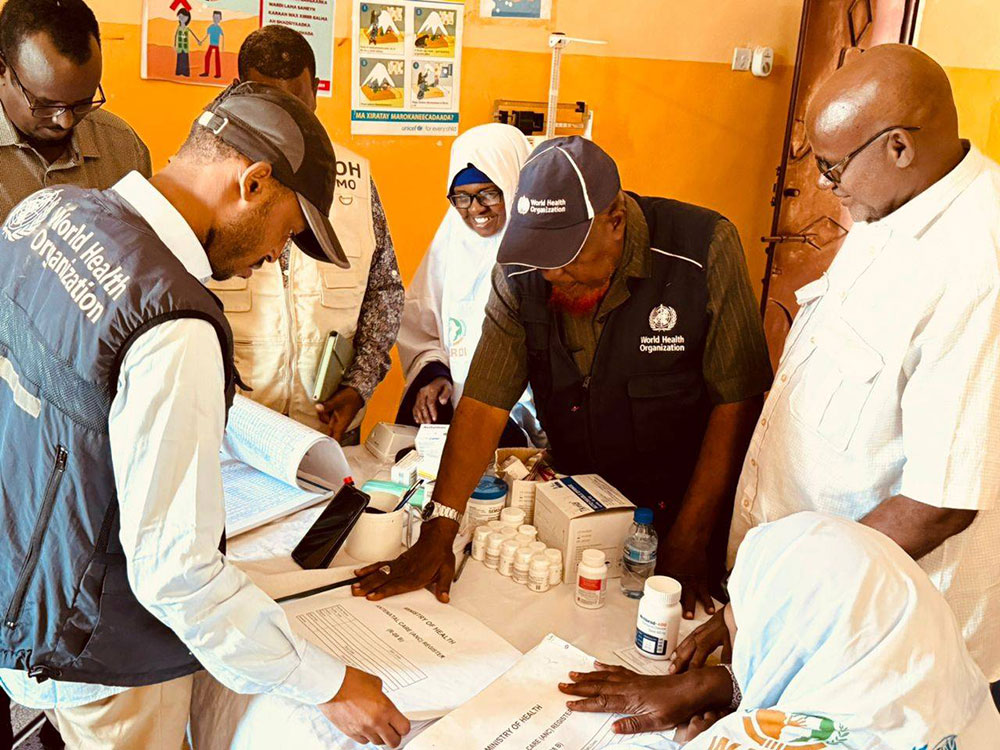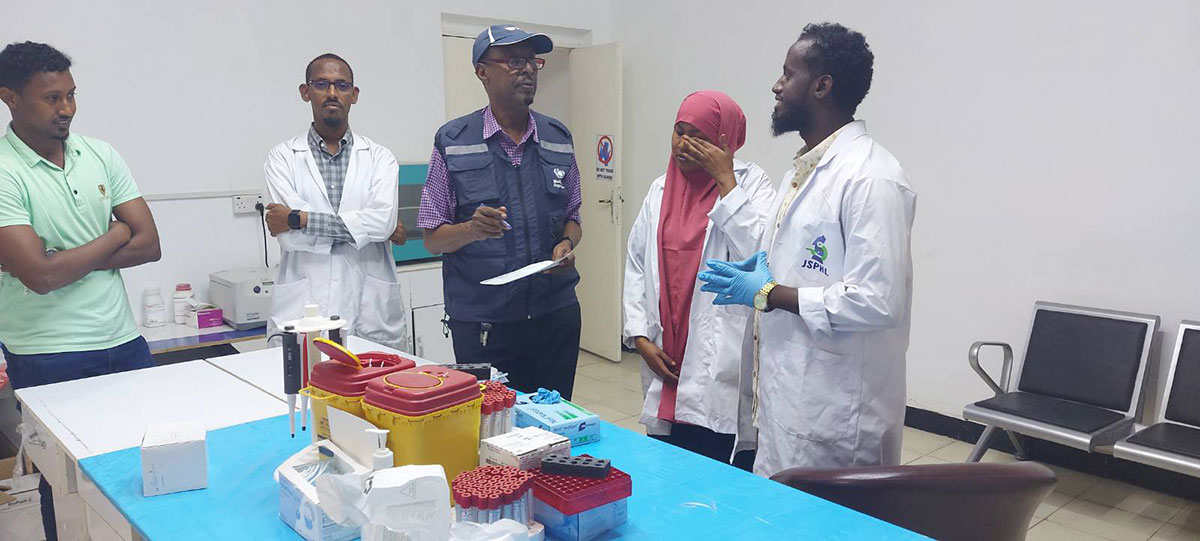 WHO and Ministry of Health personnel check for IDSR priority conditions during a joint support supervision visit to a health centre in Beledweyne district, Hirshabelle state, Somalia. Photo credit: WHO/WHO Somalia11 June 2024, Somalia – Amid the complex humanitarian emergency that is ongoing in Somalia, the population is highly vulnerable to disease outbreaks. In such a situation, early detection of disease outbreaks is crucial for an appropriate public health response and interventions.
WHO and Ministry of Health personnel check for IDSR priority conditions during a joint support supervision visit to a health centre in Beledweyne district, Hirshabelle state, Somalia. Photo credit: WHO/WHO Somalia11 June 2024, Somalia – Amid the complex humanitarian emergency that is ongoing in Somalia, the population is highly vulnerable to disease outbreaks. In such a situation, early detection of disease outbreaks is crucial for an appropriate public health response and interventions.
Somalia has been successfully strengthening its multi-disease surveillance system by implementing the Integrated Disease Surveillance and Response (IDSR) system. These efforts have been made in collaboration with the WHO Regional Office for the Eastern Mediterranean and the WHO Country Office in Somalia.
IDSR improves the efficiency and effectiveness of health information systems. IDSR data are hosted on DHIS2, the open-source software platform used nationally to collate district health information. Health workers use this platform to record, in one place, real-time information on health events and analyse data for early detection and prompt response to disease outbreaks.
IDSR system implementation
“IDSR has enabled the Ministry of Health and Human Services to stay ahead of the public health events and safeguard the health of our communities by detecting outbreaks early,” said Dr Sahro Isse Mohamed, Head of the Integrated Disease Surveillance and Response Unit, Ministry of Health and Human Services, Federal Government of Somalia.
WHO Somalia supported the development of a 3-year, multiphase operational plan. This includes technical guidelines for IDSR implementation, standard operating procedures, and training material tailored to the surveillance needs of health workers.
As of January 2024, the country has been implementing the second phase of the plan, which aims to:
improve the quality of data that health workers report to the IDSR system
link surveillance data with laboratory information
strengthen the capacity for data use at the subnational level
monitor and evaluate the implementation of the IDSR system through supportive supervision
monitor indicators
conduct review meetings with all stakeholders.
 A WHO team member and Jubaland public health laboratory technicians discuss how to increase the testing capacity of IDSR priority conditions in Kismayo district, Jubaland state, Somalia. Photo credit: WHO/ WHO Somalia
A WHO team member and Jubaland public health laboratory technicians discuss how to increase the testing capacity of IDSR priority conditions in Kismayo district, Jubaland state, Somalia. Photo credit: WHO/ WHO Somalia
Phase one was completed in 2023, with health workers from 371 out of 620 (59.8%) health facilities trained, surpassing the target coverage for the training. State-, regional- and district-level managers also took part in the training.
Thanks to these training efforts, by the end of 2023, these health facilities had submitted reports on 42 priority conditions. From epidemiological week 3 to week 13 of 2024, this number increased to 409. Of the health facilites that have received the training, 80% have been regularly submitting surveillance data.
The IDSR system has been instrumental in detecting cholera, diphtheria and pertussis alerts in Somalia since April 2023. Also, the capacity of health workers at different administrative levels has been enhanced to develop weekly epidemiological bulletins with analysis and trends of various conditions reported by health facilities. The weekly bulletins are shared with a wide range of stakeholders for decision-making and resource coordination and to the health workers as a form of feedback.
Transforming plans into actions
Planning for IDSR began in 2020, when Somalia made a strategic decision to implement such a system. In 2021, the country established a functioning IDSR system for the first time. In 2022, guidelines and training materials were developed to build health workers’ capacities to successfully use and implement the IDSR system. All these efforts have contributed to reduce morbidity and mortality associated with disease outbreaks.
The final phase of the operational plan will complete in 2024. The IDSR system will then provide a holistic approach to public surveillance of priority diseases and conditions, as well as address response needs.
Somalia has also initiated steps to implement event-based surveillance, especially at the community level, to complement the IDSR system. The country is also strengthening its public health laboratory capacity to ensure that priority diseases reported through the IDSR system are diagnosed in good time.
Rapid response teams will be trained to respond to emergencies within the community. There are also plans to establish surveillance and response systems for antimicrobial resistance, and maternal and perinatal deaths.
WHO is committed to support Somalia as it continues to develop and refine its IDSR system. This support is vital for strengthening Somalia’s surveillance system to improve the country’s preparedness and response plan to disease outbreaks.


